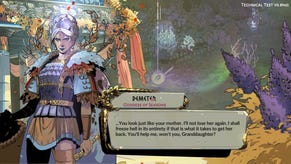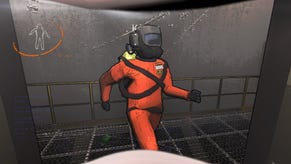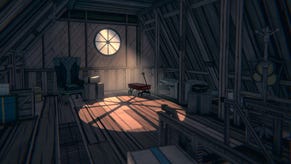The Sunday Papers
Read more
Sundays are for settling into a new life, one not surrounded by packed boxes. Now we live in a house surrounded by unpacked boxes! Who wants to build the world's biggest cardboard fort? Who wants to first read some of the past week's finest games writing?
One year after release (and before the launch of Friday's update), Oli Welsh at Eurogamer revisited No Man's Sky to consider its legacy and how the game has changed. I broadly agree with Oli's summary of the whole thing, though I'm still glad that RPS addressed the hype throughout, from the fantasies projected upon the very first vague trailer to the runaway hype train prior to release.
Coming back to No Man's Sky after 11 months and catching up on Foundation and Path Finder in one go, I found the game improved, expanded, but not transformed. No Man's Sky needed more to do, and it now has that in spades: with Exocraft (the land vehicles), the ability to own multiple starships with different specialisations and, especially, base-building, the number of upgrade paths has proliferated and the endgame ceiling has been pushed out to the stratosphere. For a certain kind of video game collector, it's soothingly compulsive stuff. The network of resources and crafting recipes has been expanded and deepened a little, the game's systems still fit together pleasingly, the Exocraft make planetary exploration less of a trudge. The work Hello has done on quality of life has more than kept pace with the game as its feature set has mushroomed, so things like inventory management niggle less than they used to, even though there is more to cope with.
At PC Gamer, Chris Livingston wrote about stream-sniping, "the practice of playing a game against a streamer while watching their broadcast to gain an advantage". He spoke to developers, steamers and snipers to discuss what, if anything, can or should be done about the unsportsmanlike behaviour.
Stream-sniping—the practice of playing a game against a streamer while watching their broadcast to gain an advantage—is nothing new for those who play games on Twitch or other streaming services for large audiences. It's been getting a bit more attention recently due to some controversy in PlayerUnknown's Battlegrounds: a player was recently banned by Bluehole for stream-sniping in PUBG, despite the developer stating they didn't have real proof of the offense, just suspicion.
At the Campo Santo Quarterly, Duncan Fyfe interviews (sometime RPS writer) Paul Dean about what it's like to drink a human toe.
So your approach was to drink the whole thing in one gulp?
I think so. The process of tilting a tumbler up ensures that the thing slides down and, as can happen I guess when you have something in a glass, it just sits there before it suddenly comes down towards you.
And so the woman’s big toe touched your teeth.
It did.
Jordan Erica Webber and Daniel Griliopoulos have co-written a book about games and philosophy, called Ten Things Video Games Can Teach Us (about life, philosophy and everything). Ahead of its release next week, Webber wrote for Eurogamer on the subject.
The question of whether to sacrifice the few to save the many is such a recognisable trope that you may already know the philosophical archetype: the trolley problem. A runaway train is about to run over five people; do you pull the lever that would divert its path such that it only killed one? Often used in discussions of utilitarianism - briefly, the view that actions are right if they promote the happiness of a majority - the trolley problem is an example of one of philosophy's favourite tools, the thought experiment. Video games are an ideal format for such experiments. They present counterfactual (i.e. "what if") scenarios and allow the player to observe and often affect what would happen next. The overuse of the term "ludonarrative dissonance" may have soured many to the notion of games as "mechanics plus narrative", but it helps when drawing parallels with philosophical practice: the narrative is the thought part, the mechanics the experiment.
Luke Winkie wrote a profile of Eloise, a Chinese professional Hearthstone player with a large western Twitch following.
"In the West I feel like people respect me as a woman, but they don’t respect me as a player. But in China, people respect me as a player but don’t respect me as a woman," she says. "In China, people hate women a lot. They’ll just say 'you’re ugly, you’re fat,' but whenever anyone ever talks about me, they might say some mean stuff but they’ll still say I’m a good player. In the West, it’s like the opposite. They’ll be like 'she’s cute, but she can’t play.'"
I enjoyed this GDC talk about design and UI by Margaret Robertson, designer on mobile games Dots, Two Dots and Dots & Co. My partner and I were hooked on Dots a couple of years ago and Robertson, a former editor of Edge magazine, is great at talking about design.
I generally hate reporting that takes the form 'Community X is angry about Thing Y'. Someone somewhere is always upset, and that upset shouldn't be newsworthy in itself anymore than people's enjoyment is news. Aside from the title, I did enjoy this short article by Gita Jackson at Kotaku however about Watch_Dogs 2's latest patch, which turned off modding in online modes, and the community's inevitably negative reaction to that. It reveals something I didn't know about, it gives fair airing to both sides, and it focuses on the details of a small community without aggrandizing their complaints.
The 1.17 patch wasn’t announced as a modding blocker. The features rolled out in it include tweaks to the recently-added four-player party mode, as well as bug fixes for co-op. Shortly after it was released, some modders noticed and began to complain. If Watch Dogs 2 had been the blockbuster Ubisoft hoped it to be, that complaint might be loud, but instead it manifests as less noticeable venting on places like the increasingly barren Watch Dogs 2 subreddit. There, loyalists who stuck with the game expressed their anger.
It's possible to encode DNA with malicious software to take over computers, which is amazing.
In new research they plan to present at the USENIX Security conference on Thursday, a group of researchers from the University of Washington has shown for the first time that it’s possible to encode malicious software into physical strands of DNA, so that when a gene sequencer analyzes it the resulting data becomes a program that corrupts gene-sequencing software and takes control of the underlying computer. While that attack is far from practical for any real spy or criminal, it's one the researchers argue could become more likely over time, as DNA sequencing becomes more commonplace, powerful, and performed by third-party services on sensitive computer systems. And, perhaps more to the point for the cybersecurity community, it also represents an impressive, sci-fi feat of sheer hacker ingenuity.
I am back hopping through Japanese bands on YouTube, so music this week is サカナクション / 新宝島.









